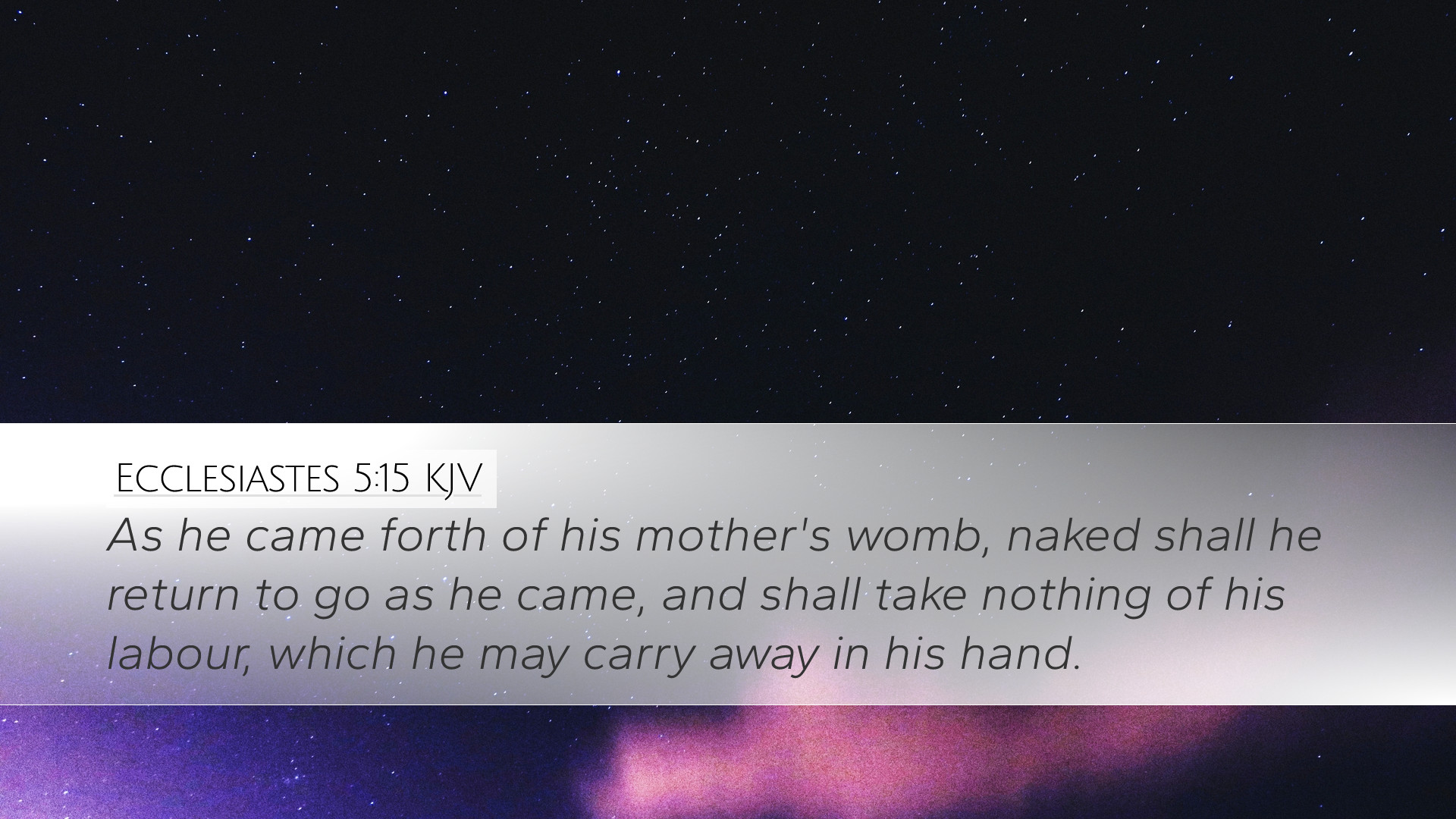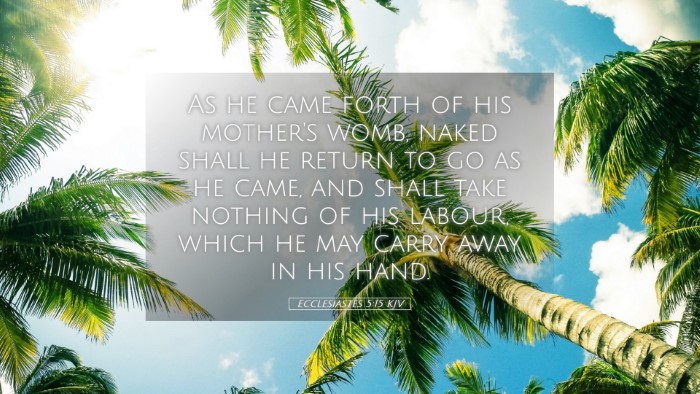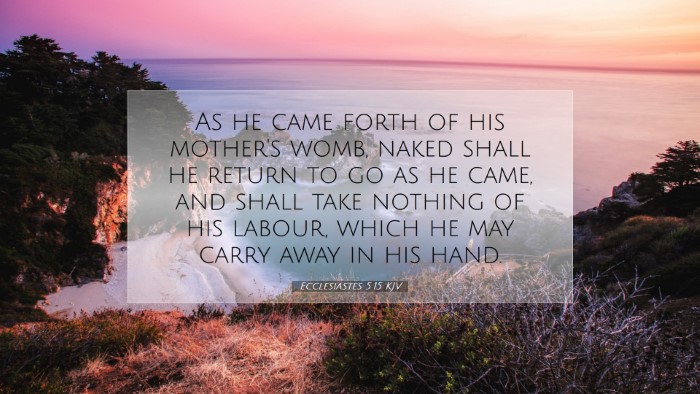Commentary on Ecclesiastes 5:15
Verse: "As he came from his mother's womb, naked shall he return to go as he came, and shall take nothing of his labour, which he may carry away in his hand." (Ecclesiastes 5:15, KJV)
Introduction
The book of Ecclesiastes is renowned for its philosophical reflections and existential inquiries about life, purpose, and the limitations of human endeavor. In Ecclesiastes 5:15, the Preacher captures a poignant truth about human existence and mortality. This verse confronts the seemingly insatiable quest for wealth and success by reminding us of our ultimate destiny.
Insights from Commentaries
Matthew Henry's Commentary
Matthew Henry underscores the transitory nature of earthly riches and the inevitability of death. He interprets this verse as a sobering reminder that humans enter the world with nothing and will leave it in the same state. Henry emphasizes the futility of laboring for material gain, which in the end is left behind. He writes:
"Though we come into the world naked, yet we strive all our lives to be rich; and when we die, we are stripped of all. How little reason have we to pride ourselves in our acquisitions, or to be envious at the prosperity of the men of this world!"
Henry also highlights how this verse aligns with the overall message of Ecclesiastes, where the pursuit of worldly pleasures is often portrayed as "vanity." The vanity is rooted in life's fleeting nature and the understanding that no one can carry away material possessions beyond the grave.
Albert Barnes' Notes on the Bible
Albert Barnes provides a theological exploration of the implications of this verse, noting that it serves as a stark reminder of human mortality. He reflects on the phrase "naked shall he return," linking it to the biblical teaching of stewardship:
"This reflects the truth that in life, we are mere stewards of what has been given to us. All our labor, though productive, ultimately does not accompany us beyond life."
Barnes elaborates that the verse challenges believers to reassess their priorities, acknowledging that life consists of more than accumulating wealth. Instead, it calls for a life of purpose grounded in eternal values rather than temporal gains. He concludes that believers should focus on the things that truly matter, such as relationships and spiritual growth.
Adam Clarke's Commentary
Adam Clarke’s insights focus on the existential aspect of the verse, emphasizing the reality of human vulnerability and dependency. He mentions that the acknowledgment of life's brevity and the transience of riches should lead to humility and gratitude:
"Recognizing our vulnerability should lead us to appreciate the gifts bestowed upon us, knowing they are temporary. We are not our possessions but the souls entrusted to us with the opportunity to serve."
Clarke suggests that understanding this truth can lead one to feel a sense of freedom from materialism, proposing that by releasing our grip on worldly possessions, we become better servants of God and others. The preacher, through this verse, invites the reader to reflect on their life's true investments, urging them to seek after wisdom, virtue, and kindness rather than wealth.
Theological Implications
Ecclesiastes 5:15 invites theological reflection on human existence from a biblical perspective. The notions of creation and return inform fundamental doctrines regarding creation, stewardship, and conversion. The preacher's observations reveal profound truths about God's sovereignty over life and death and the futility of pursuing riches apart from Him.
1. Creation and Dependency
From a creationist viewpoint, humans are born with nothing (naked) and thus are entirely dependent on God throughout their lives. This dependency is reflected in the biblical narrative that suggests human beings are made from dust and return to dust (Genesis 3:19). It affirms the belief that material possessions, power, and status are temporary and do not define one's worth before God.
2. Stewardship and Purpose
Understanding life's transience compels believers toward an ethic of stewardship. It calls them to recognize that what they possess on earth is a temporary assignment. As stewards, Christians are entrusted with resources to glorify God and serve others, leading to a more purpose-driven kingdom life.
3. Eternal Perspective
This verse aligns with the New Testament perspective where Jesus warned against the treasures of this world (Matthew 6:19-21). It invites believers to invest in heavenly treasures—those acts of kindness, generosity, and faith that reflect the character of Christ and bear eternal significance.
Conclusion
Ecclesiastes 5:15 serves as a timeless reminder of the fundamental truths of life, death, and the pursuit of meaning beyond material wealth. Through understanding the comments of revered historical theologians, such as Matthew Henry, Albert Barnes, and Adam Clarke, we glean profound insights into our motivations and priorities. This verse challenges us to live with an eternal perspective, to reorient our lives towards what is truly valuable, and to embrace our role as stewards of God's creation.
As pastors, students, and scholars dive into this profound text, may they uncover the transformative truth that transcends worldly achievements and embraces the grace and love of our Creator, leading them to invest in the eternal—fully recognizing that, ultimately, "naked shall he return."


